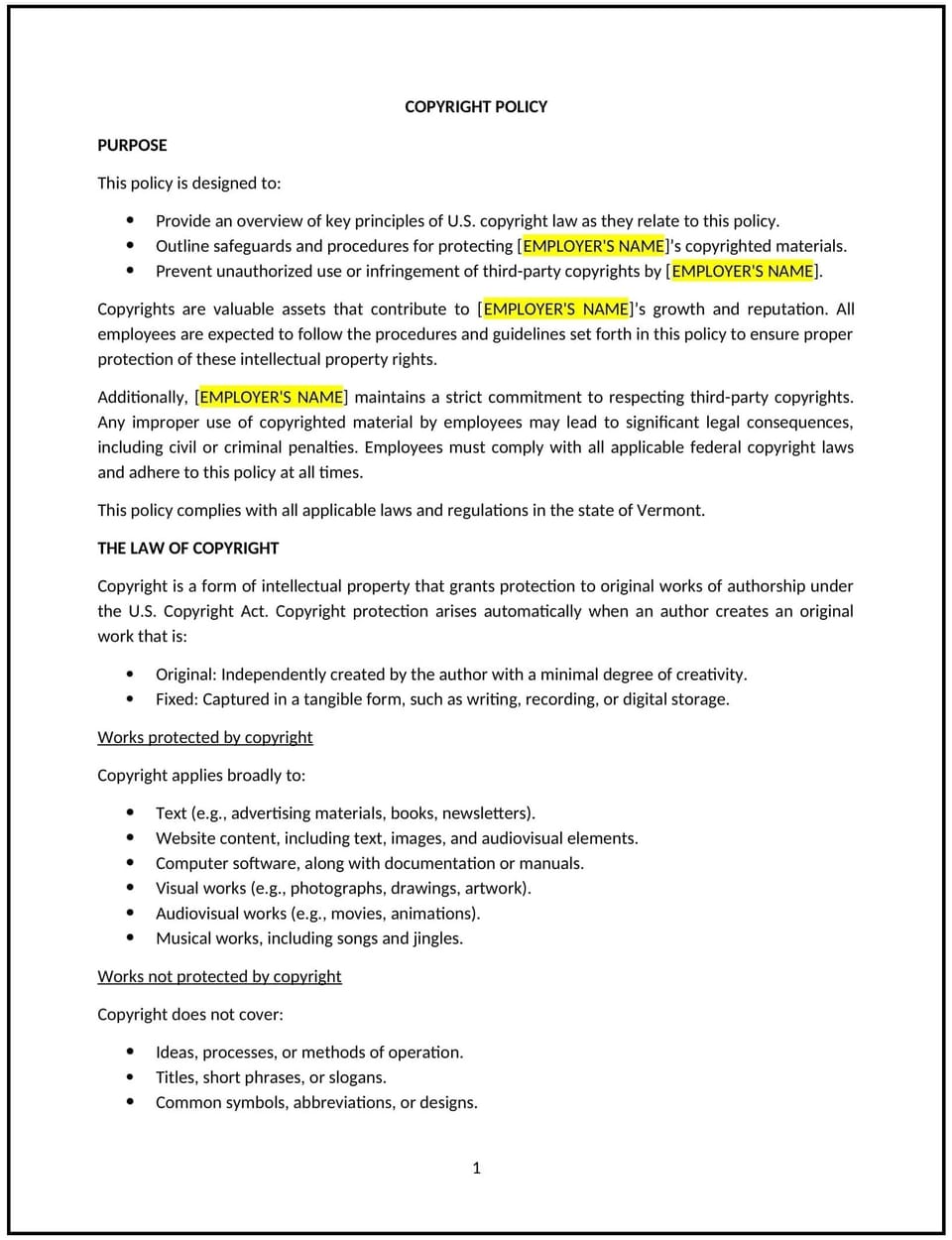Copyright policy (Vermont): Free template

Copyright policy (Vermont)
This copyright policy is designed to help Vermont businesses protect their intellectual property and respect the rights of others. It establishes guidelines for creating, using, and distributing copyrighted materials, promoting compliance with Vermont and federal copyright laws.
By adopting this policy, businesses can safeguard their creative assets, minimize legal risks, and promote ethical practices.
How to use this copyright policy (Vermont)
- Define copyright-protected materials: Specify what is covered, such as written content, software, images, videos, and other creative works.
- Clarify ownership rights: Detail who owns the copyrights for works created by employees, contractors, or third parties under various circumstances.
- Address fair use: Provide guidelines for using copyrighted materials under fair use principles, such as for education, commentary, or research.
- Include usage permissions: Require written permission before using third-party copyrighted materials in company projects or communications.
- Outline employee responsibilities: Emphasize that employees must respect copyright laws and avoid infringing on third-party rights.
- Detail reporting procedures: Encourage employees to report suspected copyright infringements involving company materials or third-party works.
- Monitor compliance: Regularly review internal practices to ensure alignment with copyright laws and industry standards.
Benefits of using this copyright policy (Vermont)
This policy provides several benefits for Vermont businesses:
- Protects intellectual property: Safeguards the company’s creative assets from unauthorized use or reproduction.
- Improves compliance: Aligns with Vermont and federal copyright laws, reducing legal risks.
- Promotes ethical behavior: Encourages employees to respect the intellectual property rights of others.
- Reduces liability: Minimizes the risk of copyright infringement claims against the company.
- Enhances clarity: Provides clear guidelines for employees on using and protecting copyrighted materials.
Tips for using this copyright policy (Vermont)
- Communicate the policy: Share the policy with employees during onboarding and include it in the employee handbook.
- Provide training: Educate employees on copyright laws and their responsibilities under this policy.
- Use copyright management tools: Implement tools to track and manage the company’s copyrighted materials.
- Require agreements: Ensure employees and contractors sign agreements that clarify ownership of works created for the company.
- Update regularly: Revise the policy to reflect changes in Vermont laws, federal regulations, or business practices.
Q: What materials are covered under this policy?
A: Copyright-protected materials include written content, software, designs, images, videos, and other creative works produced or used by the company.
Q: Who owns the copyright for works created by employees?
A: The company typically owns works created by employees as part of their job duties, unless otherwise specified in an agreement.
Q: Can employees use third-party copyrighted materials?
A: Employees may use third-party materials only with proper permissions or if the use qualifies under fair use principles, as outlined in the policy.
Q: What is fair use, and how does it apply?
A: Fair use allows limited use of copyrighted materials for purposes such as education, research, or commentary, but employees should consult the policy or legal counsel for specific guidance.
Q: What happens if the company’s copyrighted materials are infringed upon?
A: Suspected infringements should be reported to management or the legal team, which will investigate and take appropriate action.
Q: How should employees report suspected copyright infringements?
A: Employees should notify HR or the designated compliance officer and provide details about the suspected infringement.
Q: How often is this policy reviewed?
A: This policy is reviewed annually or whenever significant changes occur in Vermont or federal copyright laws.
Q: Does this policy apply to materials shared on social media?
A: Yes, all materials shared on social media by the company or employees must comply with copyright laws and this policy.
This article contains general legal information and does not contain legal advice. Cobrief is not a law firm or a substitute for an attorney or law firm. The law is complex and changes often. For legal advice, please ask a lawyer.


